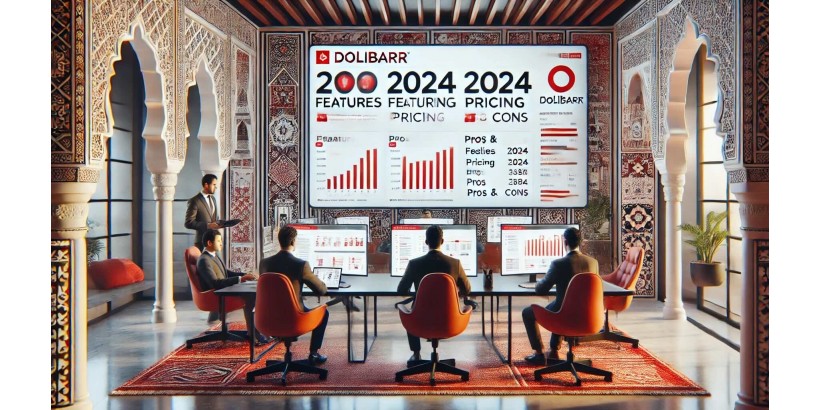
Introduction
In the ever-evolving landscape of business management software, Dolibarr ERP & CRM emerges as a noteworthy contender, particularly for small to medium-sized enterprises (SMEs). Its open-source nature, coupled with a robust set of features, makes it an appealing option for businesses looking to streamline operations. This article provides a comprehensive review of Dolibarr in 2024, covering its pricing, advantages, disadvantages, and an overall assessment.
Overview of Dolibarr
Dolibarr is an open-source ERP and CRM software solution designed for businesses of all sizes. It offers an extensive array of features that cater to various business needs, including project management, invoicing, inventory management, and customer relationship management. Dolibarr is available in both cloud and on-premise versions, allowing users to choose the deployment method that best fits their operational requirements.
Key Features
Dolibarr includes a wide range of features that can be customized according to user needs:
- Customer Relationship Management (CRM): Manage customer interactions, sales opportunities, and support tickets efficiently.
- Project Management: Track projects, tasks, and resources to ensure timely delivery and efficient use of resources.
- Invoicing and Financial Management: Create invoices, manage payments, and oversee accounting processes.
- Inventory Management: Keep track of stock levels, manage suppliers, and process purchase orders.
- Reporting and Analytics: Generate detailed reports to monitor business performance and make informed decisions.
Pricing of Dolibarr
Dolibarr's pricing structure is one of its most attractive features. Being an open-source solution, it allows users to download and use the software for free. However, there are costs associated with hosting, maintenance, and support, especially for businesses that opt for the cloud version. Here’s a breakdown of the potential costs:
- Self-Hosted Version: Free to download, but users need to pay for their own hosting services, which can range from $5 to $50 per month, depending on the provider and server specifications.
- Cloud Version: Various pricing plans exist, typically starting around $10 per month for basic features and going up to $50 or more for advanced functionalities and higher user limits.
- Custom Development: For businesses that require specific features or customizations, hiring a developer can incur additional costs, usually ranging from $30 to $100 per hour.
Pros of Dolibarr
1. Cost-Effective
Dolibarr is an economically viable option for businesses, especially SMEs. The free open-source model means companies can access powerful ERP and CRM functionalities without the hefty licensing fees associated with many proprietary solutions.
2. User-Friendly Interface
The software is designed with usability in mind. Its intuitive interface allows users to navigate easily, reducing the learning curve typically associated with ERP systems. This ease of use can lead to higher adoption rates among employees.
3. Flexibility and Customization
Dolibarr's modular architecture allows users to customize their experience. Businesses can install only the modules they need, ensuring that they aren’t paying for unnecessary features. Additionally, the community-driven development means new plugins and features are continuously being added.
4. Active Community Support
The Dolibarr community is vibrant and supportive, providing a wealth of resources, including forums, documentation, and tutorials. This community support can be invaluable for troubleshooting and finding solutions to common issues.
5. Regular Updates
Dolibarr frequently releases updates that enhance functionality, security, and user experience. This commitment to continuous improvement is crucial in the fast-paced tech landscape.
Cons of Dolibarr
1. Limited Advanced Features
While Dolibarr offers a robust set of basic features, some users may find it lacks the advanced functionalities found in higher-end ERP solutions. Businesses with complex needs may need to invest in custom development or additional plugins.
2. Initial Setup Complexity
For users unfamiliar with ERP systems, the initial setup and configuration of Dolibarr can be challenging. While the software is user-friendly, setting up the environment and customizing modules may require technical knowledge.
3. Dependence on Community Support
While community support is a strength, it can also be a drawback. Businesses that rely heavily on community forums for support may experience delays in getting their issues resolved compared to having dedicated customer service from a commercial vendor.
4. Scalability Issues
As companies grow, they may outgrow Dolibarr's capabilities. While it is suitable for SMEs, larger enterprises with more complex operations may find it lacking compared to more robust ERP systems.
Conclusion
In conclusion, Dolibarr ERP & CRM offers a compelling option for small to medium-sized businesses looking for an economical, user-friendly, and customizable solution. Its extensive features, combined with an active community and regular updates, make it a strong contender in the ERP market. However, businesses must weigh the pros and cons carefully, considering their specific needs and growth plans. For those seeking a cost-effective and flexible ERP and CRM solution, Dolibarr is definitely worth considering.
Keywords: Dolibarr ERP, Dolibarr CRM, Dolibarr reviews 2024, Dolibarr pricing, Dolibarr pros and cons, Dolibarr overview.
